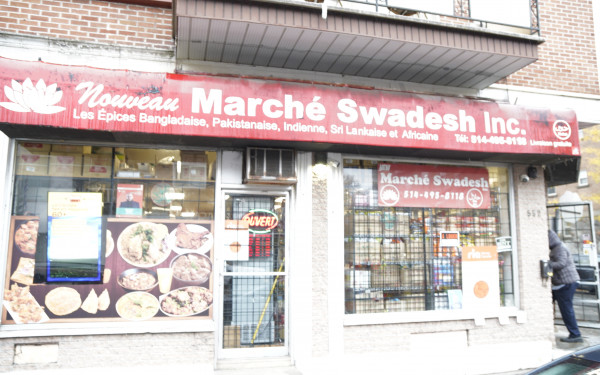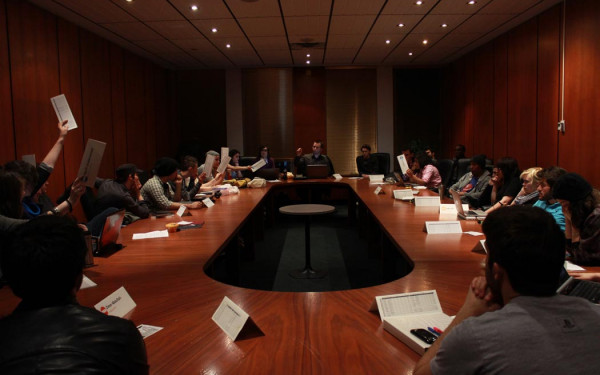Russell Copeman Enters Municipal Election Race
Concordia’s Associate VP External Affairs Running for Borough Mayor of C.D.N.—N.D.G.
Concordia’s associate vice-president for external affairs will run for borough mayor of Côte-des-Neiges—Notre-Dame-de-Grâce in the Nov. 3 municipal election.
Russell Copeman announced his candidacy on Aug. 19, joining Montreal mayoral candidate Marcel Côté’s coalition.
Copeman told The Link it was the recent scandals at city hall—from the resignation of mayor Gérald Tremblay to the arrest of interim mayor Michael Applebaum on 14 charges including fraud and breach of trust—that led him to decide to run.
“If people with experience and who feel they have something to offer don’t [step] up to the plate […] then the situation will never improve,” he said.
This is not the first time Copeman has run for public office. Before working at Concordia, he represented the electoral district of NDG in the Quebec National Assembly from 1994 to 2008.
Since 2008, Copeman has acted as a liaison between Concordia and officials at all levels of government, working under the direction of Bram Freedman, the university’s Secretary General and VP Development and External Relations. Copeman will go on an unpaid leave of absence from his position as associate vice-president for external affairs in September.
Copeman says the job has given him a deeper understanding of the importance of municipal government.
“I learned a great deal about urban planning and how institutions can have an impact on urban planning and urban development,” he said.
On Transparency
Copeman’s campaign has promised integrity, transparency and accountability if he is elected borough mayor this fall.
“If information is not easily available to the public—and in a useable form—then the information might as well not exist,” he told The Link. “I think one of the ways in which we could reduce the level of cynicism [about] politics is to make the process more transparent, which I think will in turn encourage people to get involved.”
When asked what he thought about the open-data movement calling upon governments to disclose more information to the public, Copeman said he believes there are some types of information that shouldn’t be made public—such as certain data on personnel—but that on the whole, Montreal’s administration can be much more accessible.
“The general rule ought to be: ‘Make information available to the public,’” he said. “And the exceptions ought to be just that—exceptions—and [they] should be few and far in between.”
Copeman added that something as simple as explaining online how the borough selects roads for repaving, for example, would go a long way towards demystifying how the city works and restoring residents’ confidence in the municipal government.
On Public Transit and Affordable Housing
Copeman said two major residential development projects—one on the government-owned site of the former Montreal Hippodrome, and the other in the triangle formed by Jean-Talon Blvd., De la Savane St. and the Décarie Expressway—are offering the borough an opportunity to build a model community with residents’ input.
“When I say a model community, I mean one with a mix of housing—social housing, low-income housing, single-family dwellings,” he said.
According to Copeman, a major challenge in the borough is affordable, quality housing.
“Today, when you look at the housing market, whether it’s rental or purchasing, it is almost prohibitively expensive for young people and young families to purchase a home—and that’s why we’re seeing so many young families establish themselves off the island of Montreal,” he said. “We’ve got to find ways of reversing the trend.”
Copeman wouldn’t commit to any specific proposals just yet, but said he would consider offering first-time buyers and young families property tax breaks.
As for public transit, Copeman didn’t dismiss the idea of building a tramway along Côte-des-Neiges Rd., but said money that would go towards the new tramway line could perhaps be better invested in other ways.
“Tramways are pretty expensive,” Copeman said. “I wouldn’t say they should be completely disregarded, but I think we should really try to optimize the public investment we can make in these areas and move the greatest number of people.
“My own view is that […] the city of Montreal needs to work on repairing and consolidating its existing municipal infrastructure before launching huge, new projects which are going to require massive amounts of investment from the public purse.”
A feasibility study made public in April found that the proposed tramway line would improve residents’ quality of life, but would also cost an estimated $1 billion. Richard Bergeron, the leader of rival municipal political party Projet Montréal, is a long-time proponent of tramways.
C.D.N.—N.D.G. is Montreal’s most populous borough, with 165,000 residents.

_900_600_90.jpg)


_600_375_90_s_c1.jpg)


